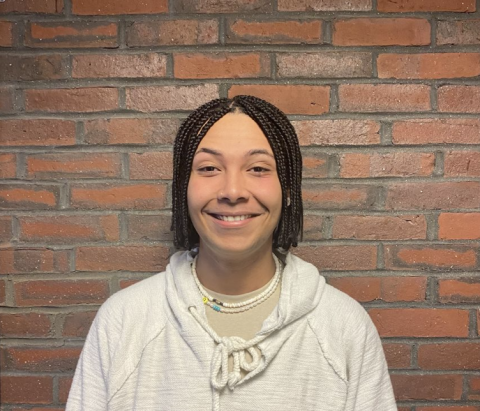The B.A. in Criminology program's flexibility enables you to deepen your studies through minors such as anthropology/sociology, business administration, child welfare and family studies, computing, French, information technology, media studies, peace and social justice studies, political science, pre-law, professional communication, psychology, Spanish, or women’s studies.
The Department of Criminal Justice at Plymouth State University aims to serve students interested in a variety of careers spanning law enforcement, investigations, court administration, corrections, juvenile services, loss prevention, as well as graduate or law school. Consistent with the general mission of Plymouth State University, the department seeks to produce well-rounded graduates who are equipped to both continue their education and enter the work force. In addition, the department serves the surrounding community, not only by producing high quality graduates well prepared to enter their field, but also by partnering with local and regional agencies to provide academic and research support.
Students in the BA in criminology degree program are exposed to a well-rounded liberal arts education that is interdisciplinary in nature. Students develop skills in a variety of areas including, but not limited to, problem solving techniques, communication skills, data analysis skills, and foreign language proficiency, along with an appreciation for ethical and professional behavior in the field. Upon completion of the program, students will understand how the criminal justice system fits into our broader society, the functions it serves, how it relates to and interacts with other fields and systems, and how policy is shaped and formed. Students will also have developed an independent sense of self, with a tolerance toward others and the ability to work in diverse cultures.

If you’re interested in a career in law enforcement, court administration, corrections, juvenile services, or graduate or law school, Plymouth State University offers two options: the B.A. in Criminology and the B.S. in Criminal Justice. Both offer challenging coursework, hands-on learning opportunities, and community-based internships that will help you build your leadership, communication, and collaborative skills. You’ll learn from faculty members who are leaders and professionals in their fields and are dedicated to helping you excel in your studies.
Curriculum & Requirements
| Course | Title | Credits |
|---|---|---|
| Major Requirements | ||
| CJ 1020 | Criminal Justice in Action | 4 |
| CJ/SO 2080 | Crime and Criminals | 4 |
| CJ 3157 | Society, Ethics, and the Law (DICO) | 4 |
| CJ 3225 | Research Methods in Criminal Justice (WRCO) | 4 |
| CJ 3260 | Data Analysis for Criminal Justice (QRCO,TECO) | 4 |
| CJ/SO 3270 | Explaining Crime | 4 |
| CJ 4805 | Criminal Justice Seminar (WRCO) | 4 |
| Major Electives 1 | ||
| Complete two courses from the following: | 8 | |
CJ 2025 | Police and society | |
CJ 2045 | Criminal Procedure | |
CJ 2075 | Corrections | |
CJ 2090 | Criminal Law | |
| Complete one course from the following: | 3-4 | |
AN 3605 | Forensic Anthropology | |
CJ 3005 | Criminal Investigation | |
CJ 3015 | Cybercrime | |
CJ 3025 | Forensic Science | |
CJ 3075 | Race, Class, Crime and Justice (DICO) | |
CJ 3110 | Youth and Crime | |
CJ 3350 | Criminal Justice and Mental Health | |
CJ 3405 | Homeland Security | |
CJ 3515 | Women and Crime (DICO,GACO) | |
CJ 3600 | Restorative Justice Practice with Youth | |
CJ 3720 | Topics in Criminal Justice | |
IS 4360 | Cultural Diversity and American Society (DICO,INCO) | |
PO 3635 | Constitutional Law: Civil Liberties | |
SO 3085 | Juvenile Delinquency | |
SO 3185 | Sociology of Deviance (DICO) | |
SO 3375 | Sociology of Race and Ethnicity (DICO) | |
| General Education | ||
| EN 1400 | Composition | 4 |
| IS 1115 | Tackling a Wicked Problem | 4 |
| MA | Mathematics Foundations | 3-4 |
| CTDI | Creative Thought Direction | 3-4 |
| PPDI | Past and Present Direction | 3-4 |
| SIDI | Scientific Inquiry Direction | 3-4 |
| SSDI | Self and Society Direction | 3-4 |
| Directions (choose from CTDI, PPDI, SIDI, SSDI) 2 | 4-8 | |
| WECO | Wellness Connection | 3-4 |
| GACO | Foreign Language 3 | 6-8 |
| INCP | Integrated Capstone 3-4 | 0-4 |
| Electives | 38-41 | |
| Total Credits | 120 | |
- 1
Several of the Major Electives have prerequisites; see their course description for details.
- 2
Directions should total 20 credits (unless the major has a waiver for a specific Direction).
- 3
The foreign language requirement for all BA degrees calls for 0-8 credits: one year of one language (6-8 credits); or one 3000/4000 level world language course (3 credits); or being a native speaker of a language other than English (zero credit). American Sign Language I and II fulfill this requirement; however, American Sign Language does not satisfy the Global Awareness Connection.
Complementary Courses
Students in Criminology are encouraged to consider a minor in another department that would interface with the field of Criminology. Free electives could be used to fulfill the requirements for minors such as: Anthropology/Sociology, Business Administration, Child Welfare and Family Studies, Computing, French, Information Technology, Media Studies, Peace and Social Justice Studies, Political Science, Pre-Law, Professional Communication, Psychology, Spanish or Women’s Studies.
Check all course descriptions for prerequisites before planning course schedule. Course sequence is suggested but not required.
To complete the bachelor’s degree in 4 years, you must successfully complete a minimum of 15 credits each semester or have a plan to make up credits over the course of the 4 years. For example, if you take 14 credits one semester, you need to take 16 credits in another semester. Credits completed must count toward your program requirements (major, option, minor, certificate, general education or free electives).
| Year One | Credits | |
|---|---|---|
| EN 1400 | Composition | 4 |
| IS 1115 | Tackling a Wicked Problem | 4 |
| MA | Mathematics Foundation | 3-4 |
| CJ 1020 | Criminal Justice in Action | 4 |
| CJ 2080 | Crime and Criminals | 4 |
| CTDI | Creative Thought Direction | 3-4 |
| PPDI | Past and Present Direction | 3-4 |
| Elective | 1-4 | |
| Credits | 26-32 | |
| Year Two | ||
| Complete two Major Electives from the following: | 8 | |
CJ 2025 |
Police and society | |
CJ 2045 |
Criminal Procedure | |
CJ 2075 |
Corrections | |
CJ 2090 |
Criminal Law | |
| SIDI | Scientific Inquiry Direction | 3-4 |
| SSDI | Self and Society Direction | 3-4 |
| Directions (choose from CTDI, PPDI, SIDI, SSDI) 1 | 4-8 | |
| GACO | Foreign Language | 6-8 |
| Electives | 4-6 | |
| Credits | 28-38 | |
| Year Three | ||
| CJ 3157 | Society, Ethics, and the Law (DICO) | 4 |
| CJ 3225 | Research Methods in Criminal Justice (WRCO) | 4 |
| CJ 3260 | Data Analysis for Criminal Justice (QRCO,TECO) | 4 |
| INCP | Integrated Capstone 3-4 | 0-4 |
| Electives | 18 | |
| Credits | 30-34 | |
| Year Four | ||
| CJ 3270 | Explaining Crime | 4 |
| CJ 4805 | Criminal Justice Seminar (WRCO) | 4 |
| Complete one Major Elective from the following: | 3-4 | |
AN 3605 |
Forensic Anthropology | |
CJ 3005 |
Criminal Investigation | |
CJ 3015 |
Cybercrime | |
CJ 3025 |
Forensic Science | |
CJ 3075 |
Race, Class, Crime and Justice (DICO) | |
CJ 3405 |
Homeland Security | |
CJ 3515 |
Women and Crime (DICO,GACO) | |
CJ 3600 |
Restorative Justice Practice with Youth | |
CJ 3720 |
Topics in Criminal Justice | |
IS 4360 |
Cultural Diversity and American Society (DICO,INCO) | |
PO 3635 |
Constitutional Law: Civil Liberties | |
SO 3085 |
Juvenile Delinquency | |
SO 3185 |
Sociology of Deviance (DICO) | |
SO 3375 |
Sociology of Race and Ethnicity (DICO) | |
| WECO | Wellness Connection | 3-4 |
| Electives | 13-15 | |
| Credits | 27-31 | |
| Total Credits | 120 | |
- 1
Directions should total 20 credits (unless the major has a waiver for a specific Direction).
- Demonstrate an understanding of criminal justice processes, terminology, and history,
- Articulate an understanding of the link between criminological theory, research methodology, and criminal justice policy,
- Analyze and evaluate moral and ethical perspectives as related to the field of criminal justice,
- Demonstrate technical competencies, and verbal and written communication skills,
- Describe and evaluate the principles of scientific methodology to become informed consumers of criminal justice research, and
- Identify and appraise the presence of biases and prejudices and the role of diversity (racial, ethnic, sexual orientation, gender, socioeconomic, age, disabilities) in the application of justice
- Attorney
- Case Worker/Manager
- Child Protective Service Worker
- Clerk of Courts
- Court Diversion Program Case Manager/Coordinator
- Correctional Officer
- Correctional Treatment Specialist
- Criminal Investigator
- DEA Agent
- Domestic Violence Counselor
- Drug Abuse Counselor
- FBI Agent
- Homeland Security Officer
- Law Clerk
- Legal Assistant
- Paralegal
- Parole Officer
- Postal Inspector
- Prison Warden
- Private Investigator
- Probation Officer
- Restorative Justice Counselor
- Victim/Witness Advocate
- Youth Service Worker/Coordinator
Explore Program Details
-
Associate ProfessorAU Leader, Justice & SecurityEmail: lgdykstra@plymouth.eduPhone: (603) 535-3324
-
Associate ProfessorProgram Coordinator, Criminal Justice; CriminologyEmail: Joshua.Wakeham@plymouth.eduPhone: (603) 535-2438
IDEA Ambassador Spotlight
Devonte Gilmore '24
Even before the center opened in 2022, Devonte Gilmore, a double major in communication and media studies and in criminology, felt it made sense to advance his work by working at the center.
Devo’s favorite thing to do during his free time is hang out with his friends. “I am a big chatter so that is what I spend most of my time doing,” he says. If not chatting, then making plans and going to do things with my people.”
For Devo, the best part about being an IDEA ambassador is what he learns from it. “No one is exempt from ignorance and in this position, I have become aware of many things I didn't know before,” he says. Devo believes getting to share his own unique experiences and outlooks as well as listening to others is a key skill to his future success.
When asked what movie he would be in, Devo’s response was “I would be in 10 Things I Hate About You. It is one of my favorite movies of all time.”

Explore Today.
Realize Tomorrow.










